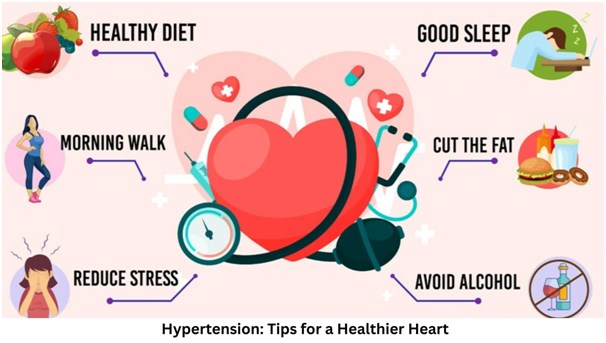Millions of people around the world are silenced by hypertension, that is, high blood pressure. It can often go unsuspected until complications arise because it enormously increases the possibility of heart disease, strokes, and other chronic maladies. The good news, however, for those suffering from hypertension or high blood pressure is that one can control it with help from lifestyle changes and adequate medication, such as with Ecosprin 75, which contains Aspirin. This blog gives important information on how to manage hypertension, the role of medications, and tips for a healthy life.
Understanding Hypertension
Hypertension is a condition where the pressure of blood against the walls of the arteries is constantly too high. It is classified into:
- Primary Hypertension: It develops gradually due to genetics, aging, or lifestyle factors.
- Secondary Hypertension: It is caused by other medical conditions such as kidney disease, hormonal imbalances, or medication use.
Symptoms of Hypertension
Hypertension is usually asymptomatic, and that is why it is often called the “silent killer.” Some people may experience:
- Headaches
- Dizziness
- Shortness of breath
- Nosebleeds
Unless treated, it can cause extreme complications such as heart attacks, strokes, and kidney failure.
The Role of Ecosprin 75 in Managing Hypertension
Ecosprin 75 is an Aspirin preparation used in the treatment of complications associated with hypertension. It does not treat high blood pressure but helps prevent the cardiovascular events of hypertension.
How Ecosprin 75 Works
- Aspirin acts as an anticoagulant by preventing blood clots from causing heart attacks or strokes.
- It reduces the workload on the heart and allows for smoother blood flow, so it benefits patients at risk of cardiovascular diseases.
- Always consult your doctor before taking Ecosprin 75 to confirm if it is appropriate for your condition.
Lifestyle Changes for Efficient Hypertension Management
Medications such as Ecosprin 75 are efficient but a healthy lifestyle is equally important in the management of hypertension.
1. Healthy Diet
Adhere to the DASH (Dietary Approaches to Stop Hypertension) diet which includes:
- Fruits and vegetables
- Whole grains
- Low-fat dairy products
- Less intake of sodium
- Avoid processed foods, sugary drinks, and excessive salt to lower blood pressure levels naturally.
2. Exercise Daily
Exercise at least 30 minutes per day. These include walking, cycling, and yogas that make the heart healthy and reduce stress, a major contributor to hypertension.
3. Limit Alcohol and Quit Smoking
Too much alcohol and smoking increase blood pressure and even damage the blood vessels. By reducing alcohol intake and stopping smoking, significant improvement in cardiovascular health can be achieved generally.
4. Reduce Stress
Stress leads to hypertension. Learn how to relax through meditation, deep breathing, or any other hobbies that help you relax.
5. Monitor Your Blood Pressure
Monitor your blood pressure at home using a reliable device. Monitoring helps keep you aware of your condition and allows you to make lifestyle changes or changes in medication if necessary.
Other Medications for Hypertension Management
In addition to Ecosprin 75, other drugs that may be prescribed based on your condition include:
- ACE inhibitors and ARBs: They help relax and dilate the blood vessels, and pressure is consequently reduced.
- Diuretics: They are helpful in removing excess sodium and water within the body.
- Beta-blockers: They lower the rate of the heart and reduce pressure.
- Calcium channel blockers: They help dilate the blood vessels and decrease the workload on the heart.
Discuss your treatment with your doctor; misuse of medication can produce side effects.
Role of Aspirin in Treating Hypertension
Aspirin is not a medication prescribed as a first-line agent in the management of blood pressure. It is useful for hypertensive patients who have had:
- Heart attack
- Stroke
- Angina (chest pain)
Aspirin prevents clotting thereby decreasing the chances of severe complications. However, use of Aspirin over a long period of time requires monitoring by a doctor due to possible side effects such as irritation or bleeding of the gastrointestinal tract.
Preventing Hypertension: A Healthy Lifestyle
1. Cut Sodium Intake
Increased salt intake raises blood pressure. Limit your daily sodium to less than 2,300 mg (about 1 teaspoon of salt).
2. Eat Potassium-Rich Food
This helps in keeping the balance of sodium in the body. Natural sources are bananas, oranges, spinach, and sweet potatoes, among many others.
3. Manage Weight
Being underweight, overweight, or obese increases the risk of hypertensive disease. Losing even little amounts of weight to the tune of 5-10% can make all the difference in keeping blood pressure levels.
4. Maintain Hydration
Keeping hydrated enables dilation of all narrowed blood vessels resulting from being dehydrated. This, in turn, leads to an increase in blood pressure. End.
When to see the doctor
When experiencing the following symptoms, you are expected to visit the doctor.
- Unrelenting readings higher than 140/90 mm Hg
- Having severe headaches or experiencing blurred vision
- Having pains in the chest or breathing problems
- Swelling in the legs and feet
- Early treatment ensures that complications due to high blood pressure are avoided
Medication and Lifestyle Together for the Best Outcome
On the other hand, medications such as Ecosprin 75 combined with changes in lifestyle help manage hypertension most efficiently. Aspirin will be taken to reduce the possibility of cardiovascular events, and it is a healthy way that deals with the causative reasons for high blood pressure.
Conclusion
Hypertension is a controllable illness if handled appropriately. If you bring in medications such as Ecosprin 75 with proper guidance, dietary changes, routine exercises, and managing stress, it will greatly help your health condition.
Always consult your doctor before changing your medication or lifestyle. Consistent effort and proper care will enable you to successfully manage hypertension and reduce the risk of complications.






































